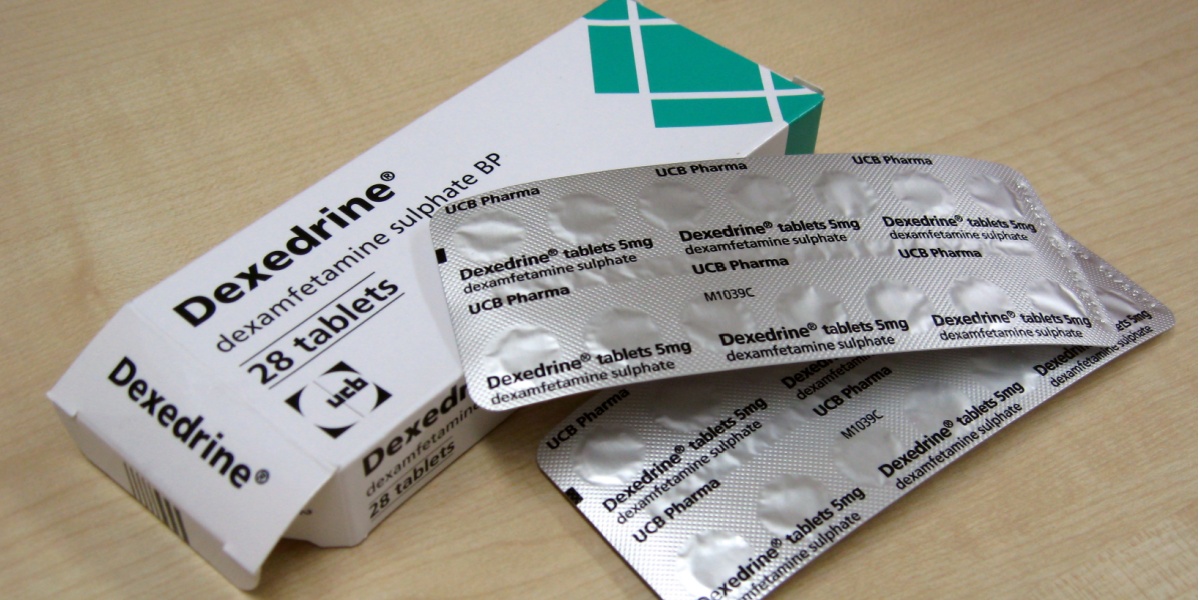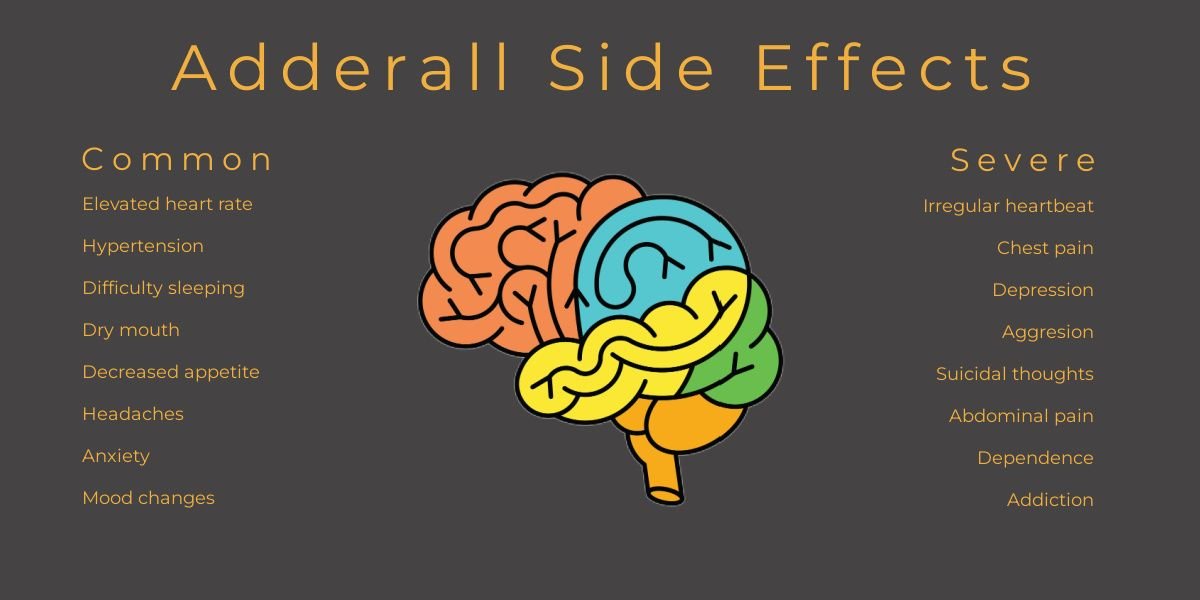Dexedrine is a medication containing dextroamphetamine, a central nervous system stimulant that is used to treat ADHD and narcolepsy. Dexedrine can cause several side effects when used as prescribed or misused, including increased heart rate, agitation, insomnia, euphoria, and restlessness. It can also cause severe side effects, in some cases, that may require professional treatment. [1]

Common side effects of Dexedrine
It is common for people to experience side effects when taking Dexedrine, particularly when commencing a new treatment or when misusing the medication. Common side effects of Dexedrine include: [1][3][6]
- Increased blood pressure and heart rate
- Palpitations
- Restlessness
- Agitation
- Anxiety
- Low mood
- Euphoria
- Elation
- Dizziness
- Insomnia
- Shaking
- Headache
- Sexual dysfunction
- Jerky movements
- Diarrhea
- Constipation
- Nausea
- Unpleasant taste in the mouth
- Dry mouth
- Reduced appetite
- Weight loss
- Blurred vision
Severe side effects of Dexedrine
In some cases, Dexedrine may cause severe or persistent side effects, which can require professional treatment. Severe side effects of Dexedrine can include: [1][3]
- Fever
- Extreme changes in blood pressure and heart rate
- Chest pain or tightness
- Trouble breathing
- Extreme fatigue and weakness
- Speech difficulties
- New or worsening physical or verbal tics
- Extreme changes in mood and behavior, such as aggression, depression, or suicidal ideation
- New or worsening psychotic symptoms, such as hallucinations and delusions
- New or worsening symptoms of mania, particularly in individuals with a history of bipolar disorder
- Suppressed growth of height or weight in children
- Seizures
- Increased risk of stroke or heart attack
- Circulation problems, indicated by cold, blue, or numb fingers or toes
- Serotonin syndrome, particularly if used alongside serotonergic medications such as antidepressants
- Tolerance
- Dependence
- Addiction
Prolonged or heavy use of Dexedrine can increase the risk of severe side effects, including tolerance, dependence, and addiction. Tolerance causes the effects of the substance to be reduced, thus requiring increased doses to achieve the same effects, which can contribute to misuse. [1]
Physical dependence is likely to develop with prolonged use of Dexedrine and can result in the onset of withdrawal symptoms when doses are reduced or stopped. Common withdrawal symptoms may include extreme tiredness, low mood, and insomnia. [1][5]
Addiction is more likely to occur following the development of tolerance and dependence, although it is a distinct condition with physical and psychological effects. Dexedrine addiction can result in harmful effects on quality of life and well-being, as well as compulsive drug-seeking behaviors. [7]
Why do people abuse Dexedrine?
used to enhance alertness and concentration to improve academic performance, increase energy to improve athletic performance, or suppress appetite for weight loss. [4]
Dexedrine impacts the levels and activity of several neurotransmitters, including dopamine, serotonin, and norepinephrine. Dopamine is the main neurotransmitter involved in the brain’s reward center and creates a feeling of pleasure. As Dexedrine causes a large release of dopamine, it contributes to a feeling of euphoria or ‘high’, which reinforces its use and abuse. [1][5]
Prolonged Dexedrine use can also contribute to the development of tolerance and dependence. When tolerance develops, increased amounts are required to achieve the same effects, which can lead to misuse of the medication. When physical dependence develops, the individual must continue to use Dexedrine to prevent unpleasant effects or withdrawal symptoms, which can also increase the risk of abuse. [1]
As Dexedrine is a widely prescribed medication, it is easily accessible to individuals who wish to abuse the substance. Some people seek multiple prescriptions, known as ‘doctor shopping’, for personal use and it is common for people to sell or share their prescriptions with others. [4]
Additionally, Dexedrine is often abused by being administered in unintended ways, such as crushing and snorting tablets or opening extended-release capsules to receive a greater and more rapid effect. [6]
Dexedrine overdose
Individuals taking Dexedrine, particularly those who misuse the substance and take large doses, may be at risk of overdose. Dexedrine is a CNS stimulant, so it can cause dangerous effects on the cardiac and respiratory systems, particularly when combined with other substances. Dexedrine overdose can be severe or even life-threatening. [1]
Signs of a Dexedrine overdose can include: [3][6]
- Uncontrollable shaking
- Severe weakness or pain in the muscles
- Rapid breathing or heart rate
- Fever
- Confusion
- Extreme changes in mood and behavior
- Hallucinations
- Fainting
- Vomiting
- Stomach pain
- Seizure
- Loss of consciousness
In the event of a Dexedrine overdose, call 911, as immediate treatment is likely to be required.
Getting treatment for Dexedrine dependence
Individuals taking Dexedrine as prescribed will receive regular medication reviews with their prescribing clinician. If it is deemed appropriate or necessary to stop Dexedrine treatment, the doctor will gradually reduce the dose to help prevent withdrawal symptoms and manage a safe cessation process. [1]
Those taking Dexedrine illicitly might require professional intervention when attempting to reduce or stop use, as they may be likely to experience severe withdrawal symptoms and risk of relapse. This support can be provided through outpatient services, involving appointments with a professional to receive medicinal and therapeutic interventions. [5][7]
Alternatively, in the case of severe Dexedrine abuse and addiction, it may be necessary to utilize inpatient services, such as a rehab center. This can provide continuous monitoring and treatment of withdrawal symptoms, reduce the risk of relapse during the detox process, and implement additional treatments for physical or mental health concerns. [5][7]
Treatment for Dexedrine dependence may include: [5][7][8]
- Medication: Although there are no approved medications for Dexedrine dependence, certain medications can be prescribed short-term to help reduce the severity of withdrawal symptoms. This can include antidepressants for low mood and anxiety, antipsychotics for agitation and psychotic symptoms, and benzodiazepines for anxiety and insomnia.
- Therapy: During the detox and recovery process, psychotherapy can be a beneficial intervention to reduce addictive behaviors, manage cravings and triggers, and treat underlying mental health issues. This can include cognitive behavioral therapy (CBT) and group therapies.
- Holistic care: During Dexedrine treatment, it is common for individuals to experience issues with physical and mental well-being such as low mood, changes in appetite, and sleep disturbances. Holistic therapies can help manage these effects and may include nutritional counseling, mindfulness, and exercise.
- Ongoing support: Many individuals with a substance use disorder can benefit from long-term intervention and support, including psychotherapy, psychosocial interventions, and support groups such as 12-step programs. This can help improve recovery and reduce the risk of relapse.


-guide-detail.jpg?v=1722504159)

